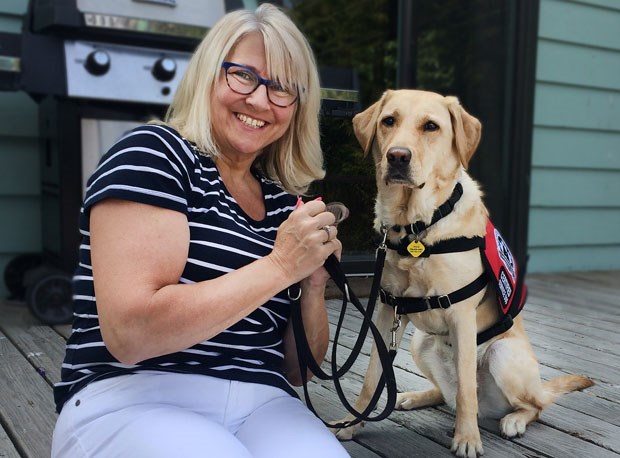Patti Urquhart can’t imagine life without her service dog Tiaa.
The Langley woman, a retired member of the RCMP, and Tiaa are the first Lower Mainland post-traumatic stress disorder team to graduate from a new combined program designed to meet the needs of Canadian Armed Forces and RCMP veterans.
“With Tiaa, she has made me accountable to my own life,” said Urquhart. “Her needing me and me being of service to her while she is of service to me has created such a bond. We go everywhere together. If I’m upset she sits her head in my lap and kisses me and gets me back. I don’t know, honestly, what I would have done a year ago with some of the stuff that I still go through without her.”
Delta’s BC & Alberta Guide Dogs and Â鶹´«Ă˝Ół»Island Compassion Dogs are amalgamating into a single agency to provide more professionally trained service dogs.
Since inception in 2014, Â鶹´«Ă˝Ół»Island Compassion Dogs has paired 26 dogs with both military and RCMP veterans on Â鶹´«Ă˝Ół»Island.
BC & Alberta Guide Dogs was founded in 1996 and breeds, raises and professionally trains guide dogs for blind/visually-impaired individuals and support dogs for children with profound autism. BC & Alberta Guide Dogs has been providing purpose-bred adult dogs and technical support to Â鶹´«Ă˝Ół»Island Compassion Dogs since its inception.
“BC & Alberta Guide Dogs is thrilled to welcome Â鶹´«Ă˝Ół»Island Compassion Dogs as part of our team,” said CEO Bill Thornton. “We have been working closely as a team since their inception, so this amalgamation is a natural next step with added services for the Canadian Armed Forces and RCMP veterans suffering from PTSD.”
The amalgamation between the two non-profits allows the PTSD program to double in size and expand to include veterans in the Lower Mainland.
Last Thursday, an event was held in East Ladner to recognize the amalgamation of the two programs.
“I met one of the program heads and she told me about this three years ago. I wasn’t at a place in my life then to do anything like this, let alone think I could need a service dog,” added Urquhart. “My GP in Nanaimo told me I would benefit from a service dog as did my psychologist. In January of last year is when I got started.”
Urquhart said she had to put her training on hold for a bit to deal with some family issues, but was heartened by the support she received.
“They just put everything on hold and said that we would pick back up when I was ready,” she said. “They were more than willing to help me out and get me through it at my own pace. Now that I have moved here to the Lower Mainland, I’m thrilled that the program has expanded and I still have all my connections to Â鶹´«Ă˝Ół»Island. You go into the program very alone, but you come out with not only a dog you love and they love you, but a whole family of support.”
Visit to learn more.
Ěý
Ěý



